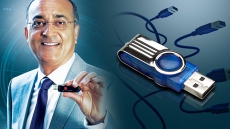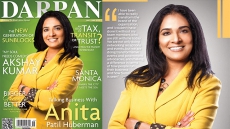There is no denying that social media has become an integral part of our life. We post on Facebook, share pictures on Instagram, send out tweets on Twitter – there isn’t a single day when we aren’t using social media to share or like something that interests us. Yet social media can be much more than merely posting, sharing or liking. One young man saw the potential and reach social media has and decided to put its features to good use.
Karthik Naralasetty, founder of Socialblood, created a social media application that connects blood donors and recipients of the same blood type through Facebook. The goal – one, to create an easy, trustworthy and a reliable network of donors around the world, and two, to grow together with hospitals, blood-banks, and supporting organizations.
Today, Socialblood has more than 300 thousand active users across the globe and has created a social space for thousands of potential blood donors and recipients to meet and donate. Now, finding an ideal blood donor is just a few clicks away.
It all began a few years ago. In 2009, Naralasetty dropped out of Rutgers University, New Jersey, to proceed with an initiative of his own. He founded Redcode Informatics, an information technology (IT) services company based in Bangalore, India. Though the company was generating good revenue, Naralasetty felt no sense of purpose to what he was doing. “I feel that when you are doing something, it should help other human beings. I did not really feel that accomplished or great about what I was doing.”

In June 2011, Naralasetty witnessed a family’s struggle to find regular blood transfusions for their four-year-old daughter to treat her thalassemia, a genetic blood disease. “I researched; spoke to a lot of people and patients to understand why it is difficult to find blood donors at times,” recalls Naralasetty, noticing the structural deficiencies in the local system of blood transfusions.
Meanwhile, he also read on TechCruch that more than 80 percent of India’s internet population is on Facebook every other day. This got Naralasetty thinking. “If so much of the population of India was connected through Facebook and logging in every day, why couldn’t we connect blood donors and recipients on a single platform? That’s when I realised that by using social media and technology, this problem can be solved,” says the innovative founder, narrating how Socialblood came into being.
He created eight Facebook groups for eight blood types and invited his friends to join in. “Not only they joined in but they actually shared requests for blood and it spread like a wildfire,” shares the young achiever.
The innovative idea was an instant hit. The same year, Naralasetty won the Ashoka Staples Youth Entrepreneur Award and travelled to the US to present his initiative in front of popular figures like Sean Parker, an American entrepreneur who served as the first president of Facebook.
Very soon, other countries started approaching Naralasetty to create something similar in their own. “I quickly realised that this is a problem people across the globe are facing.”
This surprising fact encouraged him to start his own organization. “When we started initially, it was just India. We did not have a platform for ourselves; we were doing everything on Facebook. Once that grew to around 10 to 15 thousand numbers, we understood the gravity. We launched a platform ourselves off Facebook.”
Today, Socialblood has many investors in India and the United States of America. It has received a lot of appreciation and support from many companies and organizations for its service. Naralasetty’s creation earned him a place on Forbes India 30 Under 30 list in 2015, and as one of Forbes Asia 30 Under 30 innovators recently in February.

Socialblood is simple to use. Once a user creates an account through Facebook, he/ she adds information like the city they are available in, blood type, and contact details. Then it pulls up a list of connections that are already using the service.
The filters on the top bar help to narrow down on blood request and donors available for a particular blood type. The map pulls up that information with markings on the location. The user can also make a blood request using a quick form asking critical questions.
The app can scan the network for blood relations (known people with the same blood type as ours) and also invite members. “So we are actually forming a network of blood donors within your friends circle,” adds Naralasetty.
Also, if you are looking for a particular blood type and nobody from your friend list has it, the app shows if any of your friend’s friend has it.
Socialblood has also partnered with Facebook on an initiative called Free Basics, previously called Internet.org. Through Free Basics, Facebook wants to provide free services to countries without proper internet connectivity. “We are a global partner. Wherever they go, they take us with them. So Socialblood is a free offering where people don’t have to pay for internet to use it,” states Naralasetty.
This partnership has been very beneficial for Socialblood and its users. Naralasetty shares a story of a first-time internet user in Bangladesh who used Socialblood to create a blood request for his wife. His wife was undergoing a pregnancy operation and was in need of blood. The man posted the request in his own language. Within a couple of hours, he got responses from other local people willing to support him. “So it makes an impact like never before as Facebook is touching people who have never used internet ever. People are using the internet and actually benefitting from it. That is a great milestone for us,” expresses Naralasetty of the partnership that he believes will help better Socialblood’s platform.

The reach and success of Socialblood only goes to prove that social media can play a crucial role in helping the healthcare system of any country address issues affecting the people. Naralasetty agrees, “There are not many healthcare solutions based on social media but I see a lot of start-ups using social technology to solve some problems. I think for problems like blood donation, social media is a good medium, and if you look at bone marrow campaigns, they are also using social media to a large level.”
Talking about healthcare, Naralasetty believes the health sector of India is growing. He points out that there are a lot of start-ups in India these days focussing on healthcare. This, he believes, is partially because of healthcare funds. “When we were rising funding initially, there were a lot of hiccups to do that. Now there are a lot of focussed healthcare funds supporting start-ups,” expresses Naralasetty, who is now based in San Francisco Bay Area.
He adds, “India is in a very good place right now as the country has a lot of problems to be solved and healthcare is one of the biggest problems there. Using social media and technology, I think they are dong a good job there.”
The number of Socialblood users has only been growing since the time it was initiated. That is exactly what Naralasetty expects the application to do. “We want to grow as much as possible in as many countries.”
With great partnerships such as the one with Facebook, backing of strong investors, and a service that aims to help lives, it is a given that Socialblood has a long-lasting and successful journey ahead of it. Naralasetty and his team are also tying up with a lot of hospitals to tap into their networks. “Right now the focus is making sure there is always blood when there is a requirement,” says Naralasetty summing up.


